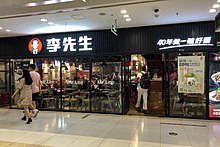Mr. Lee (restaurant)



| Beijing Mr. Lee California Beef Noodle King Co., Ltd. | |||||||
|---|---|---|---|---|---|---|---|
| Traditional Chinese | 北京李先生加州牛肉麵大王有限公司 | ||||||
| Simplified Chinese | 北京李先生加州牛肉面大王有限公司 | ||||||
| |||||||
Mr. Lee (Chinese: 李先生; pinyin: Lǐ Xiānsheng) is a popular fast-food chain in mainland China, specializing in beef noodle soup and other Chinese-style fast food. It is headquartered in Beijing.[1] The chain was formerly called California Beef Noodle King U.S.A. (Chinese: 美国加州牛肉面大王; pinyin: Měiguó Jiāzhōu Niúròumiàn Dàwáng).
The first franchise was opened in Beijing in 1988 by a Californian Chinese-American, Li Beiqi (Chinese: 李北祺; pinyin: Lǐ Běiqí), also known as "Mr. Lee". Li's face can be seen as part of the company logo, in a style similar to KFC's Colonel Sanders logo. Today, there are several hundred franchises are present in many major Chinese cities. Notable locations include Shanghai, Nanjing, Tianjin, Harbin, Changchun, Qingdao and Shenyang.[2] Mr. Lee competes with foreign franchises such as KFC and McDonald's with lower prices and a greater appeal towards Chinese tastes.[3] The California Chicken ingredients are all from within China and have nothing to do with California.[4]
Expansion
From June 2016, Mr. Lee started opening franchises in Australia, with the first restaurant in Australia being in Burwood.
References
- ^ "联系我们." Mr. Lee. Retrieved on December 1, 2014. "公司地址:北京经济技术开发区亦庄东区经海二路9号 2333 信箱 [self-published source]"
- ^ "California Beef Noodle King U.S.A". Archived from the original on 2007-08-28. Retrieved 2007-10-06.[self-published source]
- ^ Caldwell, Melissa L.; Watson, James D. (2005). The Cultural Politics of Food and Eating: A Reader. Cambridge, MA: Blackwell Pub. p. 83. ISBN 0-631-23093-9.
- ^ 郝涛 (2007-03-13). "加州牛肉面并非出自加州 被指涉嫌欺骗!" (in Chinese). Xinhua News Agency. Archived from the original on March 15, 2007. Retrieved 2017-01-11.
External links
- Mr. Lee official website (in Chinese)
